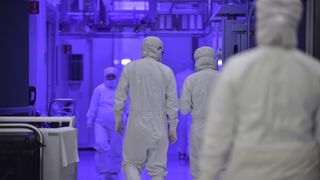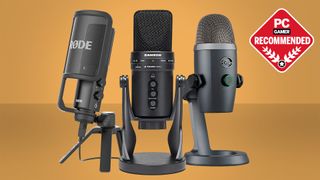Intel still can't say if it's going to manufacture all its own 7nm CPUs
"We're evaluating our process versus other third-party processes."

Intel has just wrapped on its Q3 2020 earnings call, and the company is reporting some slips in revenue, namely a 10% miss in data centre revenue. Yet it's comments made by Intel CEO Bob Swan regarding its 7nm process node that have piqued our interests: It looks like Intel's still undecided on whether to double-down on its own 7nm node or use another's.
"So as we think about 2023 and beyond," CEO Bob Swan says in the call (via Seeking Alpha), "we're looking at the products required at that time. And we're evaluating our process versus other third-party processes. And the fundamental criteria, as you could imagine, are at the macro level fairly simple: schedule and schedule predictability, product performance and economics with supply chain—our ability to control the supply chain best we possibly can.
"So the criteria are relatively simple and we're evaluating each one of those kind of as we exit 2020 and really early 2021, because that's the time that we'll have to make the determination as to whether we're buying more 7-nanometer equipment or whether a third-party foundry would be adding that capacity."
This isn't the first time Intel has spoken about the possibility of hiring an external fab to manufacture some of its chips. Earlier in the year it reported a fault in its 7nm process node would set it back by at least six months, and that it was considering hiring a third-party foundry to help ease constraints from the delay.
That 7nm process fault has since been patched up, Swan says during the call. The company says it has made "wonderful progress" with its 7nm process since, though would nonetheless explore other options alongside it.
The company is said to have already placed an order with TSMC for 6nm chips. This was said to be a one-time deal, although Swan has since been unable to offer firm guarantees as to what an external chip supply agreement would look like. It would appear Intel would hire in a third-party for individual segments of its product line, on a case-by-case basis, but fell short of ruling out an "all or nothing" deal, although said such an extreme measure appears unlikely at this time.
"On your last question, John, about is it an all or nothing" Swan says in response to a question from analyst John Pitzer regarding the mix of external foundry products. "No, I'd say, we look at server or client. We look at big core, small core. We look at some segments of the stack within the product line. So we're looking at a variety of different parameters in terms of the makeup of the business.
The biggest gaming news, reviews and hardware deals
Keep up to date with the most important stories and the best deals, as picked by the PC Gamer team.
"And as I said in my prepared remarks, it's probably not an all or nothing; it's probably a mix in terms of the best path to ensure that we had a predictable cadence of leadership products for 2023 and 2024 like we believe we will have in 2020, 2021 and 2022. And we'll learn a lot more as we have in the last 90 days during the course of the next 90 days and I think, be in a pretty good position to lay out our decision in the January time frame."
Intel's rivals have long ditched internal manufacturing in favour of external foundries. AMD used to operate its own manufacturing arm, which was later spun into GlobalFoundries, but has since shifted to TSMC to manufacture on its 7nm process.

Best microphone for gaming: make sure you're heard
Best webcams: be seen while you get your stream on
Best capture cards: lessen the load with a dedicated card
Nvidia has never operated its own fabs, instead choosing TSMC and Samsung to produce its existing graphics card lineups.
Yet Intel may not be as keen to outsource as the others. The company has long been a world leader in chip manufacturing, and undoubtedly remains one of the top companies in the sector, with fabs located in the US, Ireland, Israel, and China. It also may wish to maintain manufacturing capability for another reasons: In a recent post to its newsroom, the company extolled the virtues of being one of the last remaining semiconductor companies building chips on US soil.
In the words of Jeff Rittener, Intel's chief government affairs office, "eighty percent of the world’s semiconductor manufacturing capacity is now in Asia. Intel and the entire U.S. semiconductor industry face fierce competition in the global semiconductor marketplace. The U.S. risks falling behind in an industry it once dominated and that its economy and national security depend on."
In totally unrelated news, Intel recently sold its SSD business to South Korean company SK Hynix, including an Intel semiconductor manufacturing facility in Dalian, China.

Jacob earned his first byline writing for his own tech blog. From there, he graduated to professionally breaking things as hardware writer at PCGamesN, and would go on to run the team as hardware editor. He joined PC Gamer's top staff as senior hardware editor before becoming managing editor of the hardware team, and you'll now find him reporting on the latest developments in the technology and gaming industries and testing the newest PC components.
Most Popular




